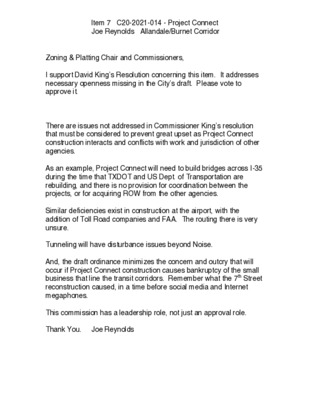07 Public Correspondence.pdf — original pdf
Backup

Item 7 C20-2021-014 - Project Connect Joe Reynolds Allandale/Burnet Corridor Zoning & Platting Chair and Commissioners, I support David King’s Resolution concerning this item. It addresses necessary openness missing in the City’s draft. Please vote to approve it. There are issues not addressed in Commissioner King’s resolution that must be considered to prevent great upset as Project Connect construction interacts and conflicts with work and jurisdiction of other agencies. As an example, Project Connect will need to build bridges across I-35 during the time that TXDOT and US Dept. of Transportation are rebuilding, and there is no provision for coordination between the projects, or for acquiring ROW from the other agencies. Similar deficiencies exist in construction at the airport, with the addition of Toll Road companies and FAA. The routing there is very unsure. Tunneling will have disturbance issues beyond Noise. And, the draft ordinance minimizes the concern and outcry that will occur if Project Connect construction causes bankruptcy of the small business that line the transit corridors. Remember what the 7th Street reconstruction caused, in a time before social media and Internet megaphones. This commission has a leadership role, not just an approval role. Thank You. Joe Reynolds To: Zoning and Platting Commissioners From: Nathalie Frensley, D7 Re: Item 7 (C20-2021-014) Please support the King Resolution regarding Project Connect Transparency and Accountability Dear Commissioners – I respectfully ask that you vote against Item 7 – C20-2021-014 – in its present form. Please support Commissioner King’s Resolution regarding transparency and public accountability in Project Connect’s proposed Foundational ordinance. At present, Project Connect’s Foundational Ordinance singly discusses Project Connect’s asserted need for streamlining administrative authority for transportation project construction. The problem is that this resolution does not explain how it will streamline without (1) reducing public access to information and opportunities for engagement; and (2) deconflicting Project Connect projects with other transportation projects that are initiated by other City of Austin departments, Travis County, State of Texas, and the Federal government. Passing Commissioner King’s resolution will be an important first step by ZAP to remedy Project Connect’s omission of public access to information and opportunities for meaningful engagement. Moreover, doing so will align with Austinites’ strong sentiments about good governance. This Project Connect Ordinance Foundational ordinance has been proposed less that four months since the June Notley/Austin Monitor public survey results revealed that 57% of Austinites think the City has headed in the wrong direction and two months since the Austin Neighborhoods Council passed its governance resolution (https://www.austinmonitor.com/stories/2022/08/anc-calls-on-city-to-improve-public- participation-ethics-rules/). A key presupposition in Project Connect’s Foundational Ordinance is the reference to the ENO Transportation Institute’s emphasis on administrative autonomy for implementing transportation projects. However, other respected independent transportation policy think tanks emphasize the important role of public inclusion and collaborative policy making for mass urban transportation transformation success. The Transit Center produced a report analyzing how City of Nashville and Transportation Authority deficiencies in engaging all public stakeholders led to failure. With only eleven months between the passage of the IMPROVE Act and a public vote, the [Nashville, Tennessee] mayor’s office prioritized speed. This urgency came at the expense of robust public engagement, with the mayor’s office in effect assuming that the Nashville MTA’s nMotion public outreach process had been sufficient. Participants in that process were not, however, representative of Nashville’s voting population, and people of color were significantly underrepresented. Those who participated in nMotion surveys weighed in on Nashville MTA’s long-range plan, but not on the specific projects they would be willing to pay for via specific tax increases. Lack of public engagement exacerbated the campaign’s insularity. https://transitcenter.org/wp- content/uploads/2020/01/nashville_report_8x10_RGB_interactive.pdf The lesson that is most relevant to the ZAP Commission tonight and Project Connect in general is that a lack of public access to information for meaningful engagement is a dedicated light rail track to policy failure (sorry, I couldn’t resist). Please learn from the lessons of Nashville and support Commissioner King’s resolution for transparency and public inclusion in Project Connect. Respectfully, Nathalie Frensley